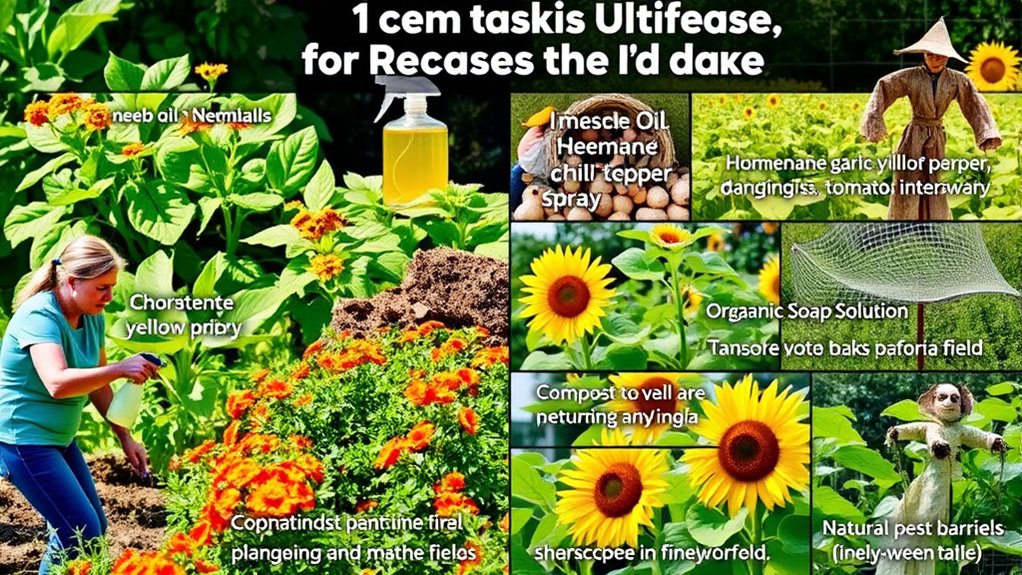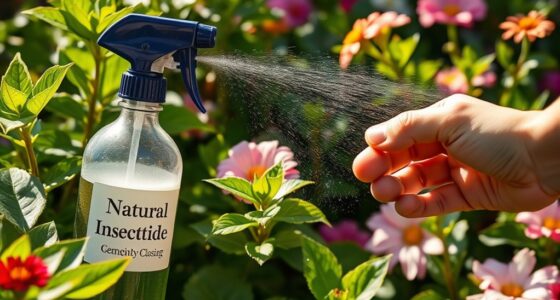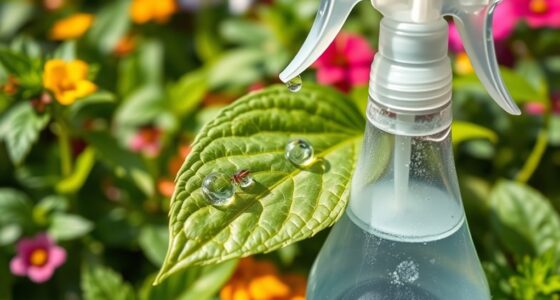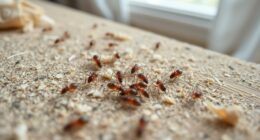To control pests organically, you should introduce beneficial insects like ladybugs and lacewings to prey on common pests, plant herbs like marigolds and fennel to attract them, and apply natural repellents such as garlic, hot pepper extracts, or neem oil. Maintain healthy soil and plants to boost their resistance and monitor pests regularly for early action. Continuing to explore this guide will reveal even more effective, eco-friendly strategies for a healthy garden.
Key Takeaways
- Introduce beneficial insects like ladybugs and lacewings to naturally reduce pest populations.
- Use natural repellents such as garlic and hot pepper extracts to deter pests without harming beneficial insects.
- Apply neem oil as an effective, organic pesticide that disrupts pest life cycles.
- Maintain healthy soil and plant vigor to strengthen plants’ natural defenses against pests.
- Regularly monitor plants and respond promptly with targeted organic remedies for early pest control.

Are you tired of using harsh chemicals to keep pests at bay? If so, you’re not alone. Many gardeners and homeowners seek safer, more sustainable ways to protect their plants and homes from unwanted invaders. One effective strategy involves harnessing the power of beneficial insects and natural repellents. These organic pest control methods are not only eco-friendly but also highly effective when used correctly. Beneficial insects, such as ladybugs, lacewings, and predatory beetles, naturally prey on common pests like aphids, spider mites, and whiteflies. Introducing or encouraging these beneficial insects in your garden creates a natural balance, reducing the need for chemical sprays. You can attract them by planting a diverse range of flowers and herbs, such as daisies, fennel, or marigolds, which serve as both food sources and habitats. Avoid using broad-spectrum insecticides that kill beneficial insects along with pests; instead, select targeted solutions or simply create a welcoming environment for these beneficial allies. Additionally, maintaining healthy soil and plant vigor can make your garden less attractive to pests and more resilient overall.
Natural repellents also play a pivotal role in organic pest management. These repellents work by discouraging pests from settling on your plants without harming the environment or beneficial insects. For example, spraying a mixture of garlic and hot pepper extracts creates a scent that pests dislike, keeping them away from your crops. Similarly, neem oil, derived from the neem tree, acts as a natural pesticide and repellent. It disrupts pest feeding and breeding cycles without harming beneficial insects or pollinators. When applying natural repellents, focus on targeted areas and follow the recommended dosage to avoid disturbing the beneficial insect populations you’ve worked hard to attract. Using natural repellents regularly can help build a pest-resistant environment, making it less likely for infestations to take hold.
The key to success with these organic pest control methods is consistency and observation. Keep an eye on your plants and identify pests early so you can respond with the appropriate natural remedies. Creating a balanced ecosystem in your garden by attracting beneficial insects and applying natural repellents reduces your reliance on harmful chemicals and fosters a healthier environment. Over time, this approach can lead to a thriving garden where pests are kept under control naturally. Remember, patience is essential; organic methods may take longer to show results, but they promote a sustainable, safe, and effective pest management system that benefits you and the planet. Moreover, understanding the causes of pest infestations can help you implement even more effective preventive measures and ensure long-term success.
Frequently Asked Questions
Are Organic Pest Control Methods Safe for Pets and Children?
You wonder if organic pest control methods are safe for pets and children. Generally, these methods prioritize pet safety and children protection, making them a safer choice than chemical options. However, you should always read labels carefully and follow application instructions. When used properly, organic solutions minimize risks for your loved ones while effectively managing pests, giving you peace of mind knowing you’re protecting your home environment.
How Often Should Organic Pest Control Treatments Be Applied?
You should consider your pest types and their life cycles to determine the right application frequency. Generally, applying organic treatments every 7 to 14 days works well for most pests, but some may require more frequent or less frequent treatments. Monitoring pest activity helps you adapt the schedule. Regular applications ensure you target pests at different stages of their life cycles, increasing the effectiveness of your organic pest control efforts.
Can Organic Methods Eliminate All Types of Pests Effectively?
Like a skilled gardener tending to fragile plants, you wonder if organic methods can fully eliminate pests. While they can be highly effective, they might not match the quick pest eradication of synthetic alternatives. Organic approaches target specific pests and promote natural balance, but some infestations may require additional strategies. You should combine methods and stay consistent, understanding that organic pest control can work well—just not always as instantly as chemical options.
Are Organic Pest Controls Cost-Effective Compared to Chemical Options?
When comparing costs, organic pest control methods can be budget-friendly over time, especially since they often require fewer applications and reduce health risks. You should consider the cost comparison with chemical options, which may seem cheaper upfront but can lead to higher expenses due to potential health issues and environmental impacts. Ultimately, your budget considerations should account for long-term savings and the safety benefits organic methods provide for your home and garden.
Do Organic Pest Control Methods Impact Beneficial Insects?
You might wonder if organic pest control methods affect beneficial insects. In fact, they are designed to target pests while conserving beneficial insects, helping maintain pest preservation. Unlike harsh chemicals, organic options like neem oil or insecticidal soaps minimize harm to pollinators and predatory insects. This selective approach ensures your garden stays balanced, supporting healthy ecosystems and reducing the need for chemical interventions that could disrupt beneficial insect populations.
Conclusion
By trying these organic pest control methods, you can protect your garden naturally and effectively. Imagine using neem oil to keep aphids at bay, just like a gardener in your neighborhood did last summer, resulting in a thriving, pest-free tomato patch. With patience and consistency, you’ll see your plants flourish without harmful chemicals. Embrace these eco-friendly techniques, and watch your garden become a healthy, vibrant oasis—free from pests and full of life.









